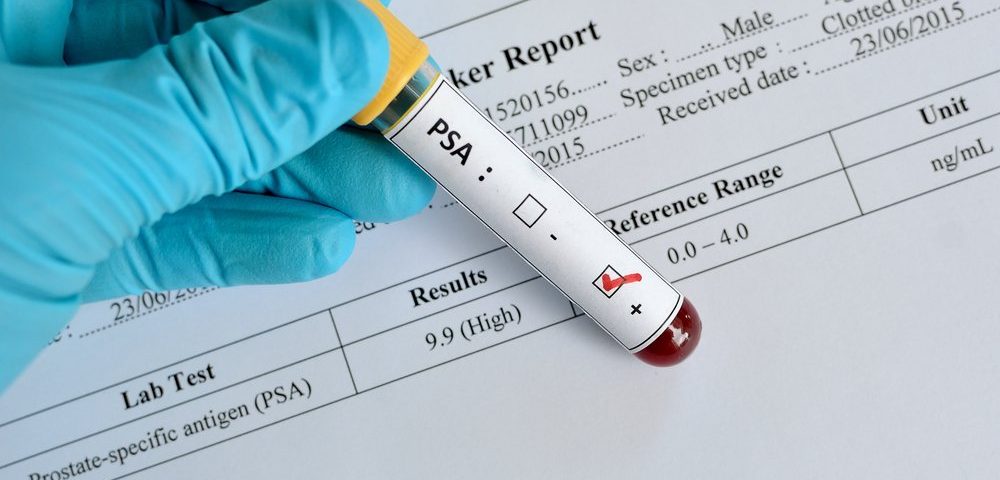Measuring PSA levels during midlife — between 40 and 64 years — could help predict the likelihood an African-American man has of developing prostate cancer up to 12 years after the analysis, a study shows.
The study, “Baseline Prostate-specific Antigen Level in Midlife and Aggressive Prostate Cancer in Black Men,” was published in the journal European Urology.
The prostate-specific antigen (PSA) is an enzyme produced by the prostate gland that has long been used to diagnose prostate cancer. The test originally was approved in 1986, but studies since suggest it also could lead to the diagnosis and treatment of cancers that may present no harm to patients; that is called over-diagnosis.
So, researchers have proposed that men undergo PSA testing during midlife to determine their risk of prostate cancer and the frequency of additional screening. If men have elevated PSA levels — higher than average, but still under normal values — they should receive more frequent screening, whereas those with lower PSA levels could receive minimal or no screening going forward.
Indeed, multiple studies have shown that measuring PSA levels from 40 to 60 years strongly predicts prostate cancer incidence and risk of death several decades after testing.
However, most of the data come from studies involving white men, with only two studies examining this approach in black men.
Now, researchers aimed to determine if measuring PSA levels during midlife could predict prostate cancer risk in black men, focusing particularly on aggressive cancers.
“Black men in the U.S. are 2.5 times more likely to die of prostate cancer compared to white men, yet screening studies to date have largely been focused on white men,” co-lead author Lorelei Mucci, MPH, said in a press release. “As such, the data from our study address a critical gap in understanding the substantial racial disparities and suggests a potential strategy to reduce prostate cancer death in black men.”
Investigators wanted to establish which patients were at higher risk of developing prostate cancer later in life. To do so, they used data from the Southern Community Cohort Study (SCCS), that has a high number of African-American samples.
Their study included 197 black men from 40 to 64 years old who were not diagnosed with prostate cancer at the time of enrollment, but later developed the disease. Of these patients, 91 suffered from aggressive prostate cancer.
Additionally, 569 black men who matched the prostate cancer patients in age and date of blood sample collection were used as controls.
Because PSA levels tend to increase with age, patients and controls were compared across different age groups. But regardless of age, the higher the PSA levels, the higher the risk for prostate cancer, researchers found.
Compared to men whose PSA levels were lower than the median for their age group, those with levels above median had an 18- and 25-fold higher risk for prostate cancer. And, for patients who had the 10% highest PSA levels, their risk was between 72 -and 84-fold higher.
A similar trend was observed for aggressive prostate cancers. If men had PSA levels above their age-group median, their risk for aggressive disease was 19 to 50 times higher than for those with PSA measurements below the median. For those with the 10% highest values, the risk was 52 to 174 times higher.
Consistent with the observations, 95% of all prostate cancer patients, and 97% of those with aggressive cancers, had a PSA level that was above the median for their age group.
The findings suggest that midlife PSA levels strongly predict the risk for prostate cancer later in life among black men, similar to that seen in white men, and that this approach could be used to determine the frequency of further screening, reducing over-diagnosis and over-treatment in men unlikely to have life-threatening cancers.
“We found that a single, baseline PSA level measured during midlife strongly predicted subsequent diagnosis of total and aggressive prostate cancer up to 12 years after a blood draw,” said co-lead author Mark Preston, MD. “Our findings suggest that targeted screening based on a midlife PSA might identify black men at high risk of aggressive prostate cancer while minimizing screening in those at low risk.”
“The totality of evidence from this study and previous work provides strong support for use of midlife PSA level to determine a personalized screening strategy,” researchers concluded.

